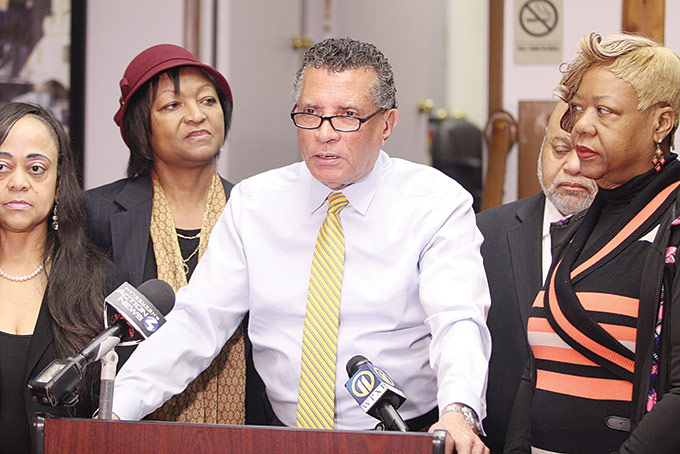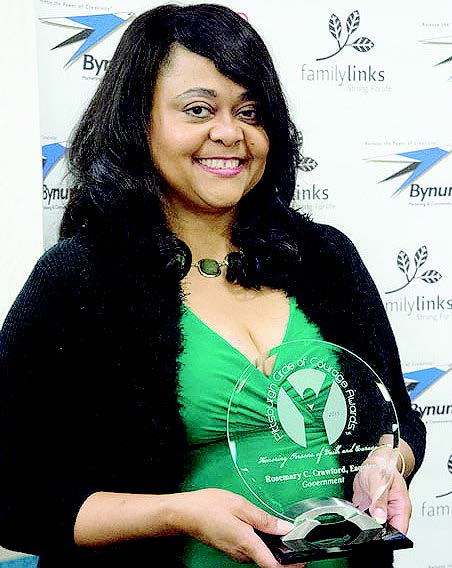by Rob Taylor Jr.
Courier Staff Writer
Rosemary Crawford has made it official.
The longtime attorney is determined to make this year, 2021, the year that she attains a seat on the Allegheny County Court of Common Pleas, as she recently announced she’s running for the position in the upcoming May 18 primary election.
“I am excited about the possibility of bringing my legal experience to the table as a judge,” Crawford said in a Jan. 27 statement announcing her candidacy. “I have worked with people of all walks of life and understand their unique circumstances, stories, and experiences and vow to bring a level of compassion and fairness to the bench. I look forward to earning the support of voters in the coming weeks. Growing up as the daughter of a Pullman porter and a public school teacher, my parents, both strong union members, instilled in me the value of fairness and impartiality and the consequences of favoritism.”
Currently, there’s just one Black woman on the county’s Common Pleas Court —Kim Berkeley Clark, the president judge. She was appointed to the court in 1999 by then-Governor Tom Ridge. There hasn’t been an additional Black woman on the court this century, now 20 years, one month and counting.
Crawford said it’s time for the drought to stop. Tim Stevens agreed. Stevens, the longtime civil rights advocate in Pittsburgh and current President and CEO of the Black Political Empowerment Project, implored Pa.’s current governor, Tom Wolf, to appoint Crawford and other African Americans to state and county courts, during an open letter directed to the governor in December 2020.

B-PEP CHAIR TIM STEVENS urges Gov. Tom Wolf to appoint Rosemary Crawford, far left, to the Allegheny County Common Pleas Court, during a press conference, March 11. (Photo by J.L. Martello)
“We (B-PEP) mentioned in our letter of March 11, 2019 that Ms. Crawford had been ‘highly recommended’ by the Allegheny County Bar Association in 2013, and was also endorsed by the Pittsburgh Post-Gazette, the Tribune Review, and the New Pittsburgh Courier in that same year,” Stevens wrote. “…With the number of anticipated openings we strongly request that you not stop with merely the appointment of Ms. Crawford, but that you use this opportunity to expand your ability to help correct the wrongs of the past.”
The Allegheny County Common Pleas Court has three additional Black judges in addition to President Judge Clark—Judge Dwayne Woodruff, Judge Elliot Howsie and Judge Joseph K. Williams III, all men. Williams is in the orphans’ division; the others are in the family division. There are no Black judges in the criminal division.
In a Twitter post dated Jan. 30, Crawford, who is active on social media, stated: “Black women judges are important because the bench should (look) like the community. One female Black judge in Allegheny (County) is insufficient, particularly with the facts of injustice we have been suffering.”
The year 2021 isn’t the first time Crawford was vying for the bench. As the Courier previously reported in 2019, Crawford had unsuccessful runs for the Common Pleas Court in 2013, 2015 and 2017. But she acknowledged in the article that she’d been getting increasing support from more Black community leaders. “I’m getting more interest with each run and that’s important for a grassroots campaign,” Crawford said in the Courier’s 2019 article. “Sometimes you just have to be committed, not give up. Because enough people have given up on our community. I’m not going to be on that list.”
One big difference from 2013, 2015 and 2017 to today is the heightened sense of awareness concerning racial injustice in the U.S. As advocates like Stevens would tell you, it’s long overdue. However, more African Americans have been attaining more prominent roles over the past eight months since the “Black Lives Matter” movement really took hold following the death of George Floyd by a White police officer in Minneapolis. Blacks are getting prominent positions in politics (which, of course, includes the first Black vice president and first female vice president in Kamala Harris), corporate America and in the non-profit sector.
In Duval County, Fla., of which Jacksonville is located, Rhonda Peoples-Waters made history a few weeks ago when she was sworn-in at the county courthouse as the first elected Black female court judge to take the bench in the county. Three other Black women have been appointed, but no Black woman had ever won an election to become a judge. Duval County has a population of 865,000, with 28 percent African American.
In Harris County, Texas, where Houston is the county seat, before there was the “Black Lives Matter” movement sweeping across America, there was “Black Girl Magic.” That magic resulted in a head count today of 19 Black female judges in the District Courts of Harris County, as it’s called. The 19 Black female judges, believed to be one of the highest assembly of Black female judges in a single county court in the U.S., are spanned throughout the court’s divisions. For example, one might see, among other Black female judges, Judge Angela Graves-Harrington or Judge Germaine Tanner involving a family court matter. If it’s a civil matter, one might see Judge Latosha Lewis Payne or Judge Dedra Davis.
Summoned to the criminal court, and one might see Judge Lori Chambers Gray with the gavel.

PICTURED ABOVE ARE THE 19 BLACK FEMALE JUDGES that are part of the Harris County, Texas, District Court, one of the largest contingents in the country of Black female judges on a county court. Houston is located within Harris County.
Harris County has a much larger general population (4.7 million) than Allegheny County (1.2 million), and it’s more diverse. While Blacks make up about 14 percent of Allegheny County’s population, Blacks make up almost 20 percent of the population in Harris County. Hispanics account for another 30 percent in Harris County, while the Hispanic percentage in Allegheny County is miniscule.

Rosemary Crawford, ESQ.
Whether she’s appointed by Gov. Wolf or elected by the Allegheny County populous, Crawford said she is beyond ready for a seat on the Allegheny County Common Pleas Court. She is a graduate of the Georgetown Law School, in Washington, D.C., and currently serves as a Chapter 7 Bankruptcy Trustee for the Western District of Pennsylvania. As Chapter 7 Trustee, she serves a quasi-judicial role presiding over thousands of complex bankruptcy matters, her bio stated. Crawford feels that her extensive experience in civil litigation, family law and employment law, as well as appellate practice, give her the experience and temperament needed to serve on the Court of Common Pleas.
Crawford, according to her bio, also is a certified arbitrator and mediator. She has served on the boards of the Allegheny County Bar Association, Pennsylvania Bar Association, Women’s Bar Association, and Homer S. Brown Association. Crawford has served as a trial attorney with the U.S. Department of Justice, an adjunct professor of Employment Law at the University of Pittsburgh School of Law, and taught Criminal Procedure and Business Law at Community College of Allegheny County.
Crawford told the Courier her record of serving the community speaks for itself. She served for five years as director of the YWCA of Greater Pittsburgh Women Legal Resources, where she oversaw counseling and provided pro bono legal services for women in need. She also has provided pro bono services for almost a decade for women seeking protection from abuse orders against violent partners.
Crawford, the North Hills-area resident, also told the Courier she’s moving forward with her campaign without the Allegheny County Democratic Committee’s endorsement, “due to its history of systemic racism and failure to timely respond to my requests for information.”
It wasn’t a secret that Crawford would dive back into the running for a Common Pleas Court seat. Crawford’s campaign and overall profile have been garnering more attention over the past few years locally. A day after the local media was informed that Crawford made the official announcement of her campaign bid, she took to Twitter, Jan. 28, at 2:52 p.m., to officially inform her supporters.
“Hello, everyone,” she simply said, with an attached photo of herself and the campaign announcement. “I believe I can make a difference.”